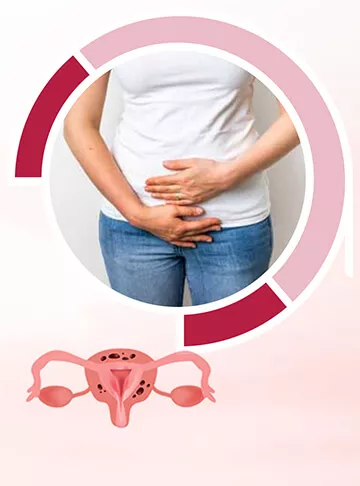What is Adenomyosis?
Adenomyosis is a gynaecological condition that can affect women of various ages, causing pain and discomfort in their daily lives. Adenomyosis occurs when the tissue that normally lines the uterus (endometrium) begins to grow into the muscular wall of the uterus (myometrium). This abnormal growth of endometrial tissue can lead to a range of symptoms and complications, including heavy menstrual bleeding and severe pelvic pain.
Who can get Adenomyosis?
Adenomyosis primarily affects women in their childbearing years, typically between the ages of 30 and 50. However, it can occur in women of any age. Women who have had multiple pregnancies or uterine surgeries may be at a higher risk of developing adenomyosis.
What are the Types of Adenomyosis?
There are two main types of adenomyosis:
1. Focal Adenomyosis: In this type, the abnormal growth of endometrial tissue is localized to one specific area within the uterine wall.
2. Diffuse Adenomyosis: This is the more common type, where the abnormal tissue growth is spread throughout the entire uterine wall.
What are the Causes of Adenomyosis?
While the exact cause of adenomyosis is not fully understood, several factors may contribute to its development:
1. Hormonal Influences: Hormonal imbalances, especially an excess of estrogen relative to progesterone, are thought to play a significant role in the development of adenomyosis.
2. Uterine Trauma: Surgeries such as cesarean sections or fibroid removals may increase the risk of adenomyosis by allowing the endometrial tissue to penetrate the uterine wall.
3. Inflammation: Inflammation within the uterus may promote the growth of endometrial tissue into the myometrium.
4. Genetic Factors: There may be a genetic predisposition to adenomyosis, as it often runs in families.
What are the Symptoms of Adenomyosis?
Adenomyosis can manifest with a variety of symptoms, which can range from mild to severe. Common symptoms of adenomyosis include:
1. Menstrual Irregularities: Women with adenomyosis often experience heavy and prolonged menstrual bleeding, as well as irregular periods.
2. Pelvic Pain: Many women with adenomyosis report experiencing pelvic pain, which can be crampy and debilitating. The pain may worsen during menstruation.
3. Painful Intercourse: Adenomyosis can lead to discomfort or pain during sexual intercourse.
4. Enlarged Uterus: The uterus may become enlarged due to the presence of adenomyotic tissue.
5. Pressure on the Bladder and Rectum: In some cases, adenomyosis can cause pressure on nearby organs, leading to urinary and bowel symptoms.
How is Adenomyosis Diagnosed?
Diagnosing adenomyosis can be challenging, as its symptoms overlap with other gynecological conditions. To make an accurate diagnosis of adenomyosis, a healthcare provider may use the following approaches:
1. Medical History and Physical Examination: The healthcare provider will inquire about the patient's symptoms and perform a pelvic exam to check for an enlarged uterus.
2. Imaging Tests: Ultrasound, MRI, or a transvaginal ultrasound may be performed to visualize the uterus and identify adenomyotic lesions.
3. Biopsy: A biopsy may be recommended to confirm the presence of adenomyosis by examining a tissue sample.
4. Differential Diagnosis: Adenomyosis must be distinguished from other conditions such as fibroids, endometriosis, or uterine cancer.
How is Adenomyosis Treated?
The choice of treatment for adenomyosis depends on the severity of symptoms, the patient's age, and her desire for future fertility. Several adenomyosis treatment options are available:
1. Conservative Management: Mild cases may be managed with over-the-counter pain relievers and hormonal medications to control heavy bleeding and pain.
2. Hormonal Therapy: Hormonal treatments, such as birth control pills, hormonal IUDs, or GnRH agonists, can help regulate menstruation and alleviate symptoms.
3. Uterine Artery Embolization (UAE): This minimally invasive procedure blocks the blood supply to adenomyotic tissue, reducing symptoms.
4. Endometrial Ablation: In some cases, endometrial ablation may be recommended to remove the lining of the uterus and relieve symptoms.
5. Hysterectomy: For severe cases or when other treatments fail, a hysterectomy (removal of the uterus) may be considered, providing a definitive cure.
Seeking early diagnosis and appropriate treatment from fertility experts can significantly improve the lives of women affected by adenomyosis, allowing them to regain control over their health and well-being.
Frequently Asked Questions (FAQs)
Can adenomyosis affect fertility?
Yes, adenomyosis can impact fertility, especially in severe cases. It can interfere with the implantation of a fertilized egg in the uterus. However, many women with adenomyosis can still conceive and carry a pregnancy to term with appropriate treatment.
Is adenomyosis the same as endometriosis?
No, adenomyosis is different from endometriosis. While both conditions involve the abnormal presence of endometrial tissue outside its usual location, adenomyosis specifically refers to the growth of this tissue within the uterine wall (myometrium). Endometriosis involves the presence of endometrial tissue outside the uterus, often on other pelvic organs.
Can adenomyosis be prevented?
Adenomyosis cannot be prevented, but certain measures, such as maintaining a healthy lifestyle and managing hormone imbalances, may help reduce the risk or severity of symptoms.
What is the recovery time after a hysterectomy for adenomyosis?
Recovery time after a hysterectomy varies from person to person. It typically ranges from a few weeks to a few months. Factors like the type of hysterectomy (laparoscopic, abdominal, or vaginal) and individual health play a role in the recovery process. Patients should follow their healthcare provider's post-surgery instructions for a smooth recovery.
Pregnancy Calculator Tools for Confident and Stress-Free Pregnancy Planning
Get quick understanding of your fertility cycle and accordingly make a schedule to track it
Get a free consultation!















